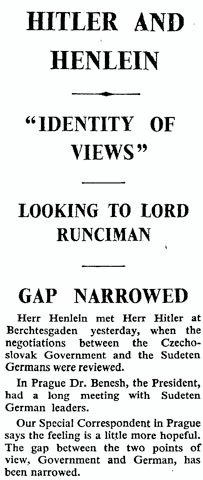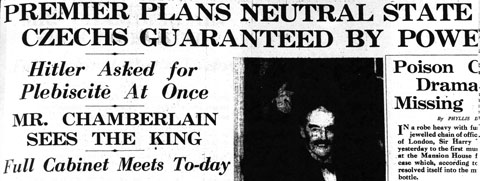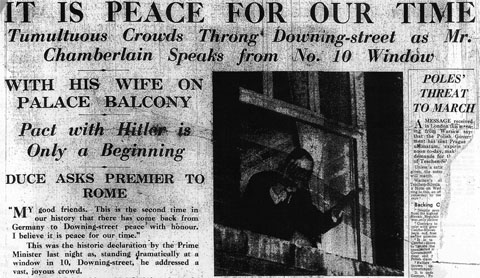
More good news, or at least that’s how it is presented. The dailies today all have pretty similar headlines to those from The Times, above (p. 10), but their stories differ in detail. Henlein has met with Hitler and it would seem that they agreed that the Sudetens should negotiate with the Czechs on the basis of Henlein’s previously-announced demands, but without either accepting or rejecting the Czech autonomy plan. The Manchester Guardian thinks (p. 11) that Henlein is to present specific counter-proposals, and the Daily Mail says (p. 9) that Henlein has already done so in a meeting with Beneš. No details are given of these counter-proposals, but all three seem to agree that Henlein and Hitler are genuinely interested in reaching a compromise with Beneš. Such faith seems touchingly naive today, with the benefit of hindsight. Here’s another example, from The Times:
National-Socialist circles here think that he [Hitler] would propose a “reasonable” solution and there would be no hasty unilateral measures. The Reich, while determined to force a settlement, is, they say, desirous of doing so by methods which will not compromise future relations with England and France. In fact she wants a settlement which can be the starting point of real European collaboration.
The danger, it is pointed out, that a situation may develop in Czechoslovakia which may compel Herr Hitler to act regardless of what is thought in London and Paris. The German newspapers’ reports of alleged ill-treatment of Sudeten Germans must already have made a painful impression on his mind and inclined him to lend a willing ear to those more adventurous Nazi circles who, in the belief that France cannot and England will not do anything, hold that Germany need not be deterred by fear of war from settling the Czechoslovak question by direct and independent action.
The view here is of Hitler as somebody who does not want war, but who cares about the German people, including the Sudetens, and may be forced by the pressure of events to act, reluctantly, to protect them by the use of force. It’s hard to square this with what we now know of Hitler as a deeply cynical and manipulative warmonger, but it must be remembered that so many of the events which define Nazi Germany for us today still lay ahead (Kristallnacht, for example, was still two months away). He’s not yet the Hitler we know, as far as the outside world is concerned.
More talk of military preparations today. The Manchester Guardian claims (p. 11) that Germany has carried out ‘something more than a normal mobilisation’, while the Daily Mail reports (p. 9) that Czech army and police units have been moving into the Carlsbad region of the Sudetenland, including ‘heavy tanks’ and ‘heavy long-range artillery’. Yet, according to Kingsley Martin, writing (p. 338) as ‘Critic’ in the New Statesman (a Saturday publication), ‘The general public has only just begun to wake up to the danger’. This seems odd given that the papers have been going on about the crisis all week; and the Manchester Guardian reported on Tuesday that Londoners were talking about it even then. Maybe Martin moved in different circles (the people he quotes are ‘country people’ and date from the previous weekend). Or maybe people are getting bored of a week of ‘crisis’ without anything much actually happening?
![]() This work is licensed under a Creative Commons Attribution-NonCommercial-NoDerivatives 4.0 International License.
Permissions beyond the scope of this license may be available at http://airminded.org/copyright/.
This work is licensed under a Creative Commons Attribution-NonCommercial-NoDerivatives 4.0 International License.
Permissions beyond the scope of this license may be available at http://airminded.org/copyright/.






Great posts, Brett.
Just reading McKinstry’s ‘Spitfire’ (me being such a dag and all).
You know how many operational Spits were in service during Munich?
Precisely: 1.
CK – Running the ‘if there was wear at the time of (DebateName) Crisis’ scenario is interesting, whatever the presumptions. It’s often overlooked that the Luftwaffe wasn’t the 1940 strength foe any more than the RAF was, and the (short-range) Spitfires would have been of little use to the AASF if the Continent hadn’t been occupied. Hitler relied on a lot of bluff with his air force.
Oh, I thought there were 3? Or did that include unserviceable Spits?
There were only 60-odd Hurricanes too. Fighter Command would had to rely on the last generation of biplane fighters. But as JDK says, the Luftwaffe was not all that either, and it was in no way ready to carry out a serious bombing campaign against Britain in 1938 (particularly without bases along the Channel). Then again, it had made the monoplane transition earlier than the RAF, which would have given it an advantage.
Am I the only person that keeps mis-reading this as ‘Hitler and Heinlein’?
‘I love the quasi-fascist imagery of Starship Troopers, Herr Heinlein – truly your finest work.’
CK: What’s your opinion of the McKinstry book? I thought the first 2/3rds were truly excellent, but from about 1941 onwards the book tried to cover too much, and didn’t add anything that hadn’t been said many times before.
“What’s your opinion of the McKinstry book?”
In short, Jakob, great read and I cannot believe that I bought yet another book about aircraft. Clearly, I have no life.
I think it’s a great piece of research, especially the bits about how the plane came into being, production difficulties etc etc etc.
I’m about 2/3 through, and it’s still BoB, so I’m guessing the the later Mks will be a bit rushed.
Oh. And the book confirms (yet again) that Douglas Bader remains an incompetent insufferable egotistical arsehole who should never have been placed in charge of a bicycle, let alone a piece of machinery.
You’re lucky I don’t keep mistyping it that way!
Just catching up, a few days at a time so to speak, and until Jakob’s point above was indeed under the impression this was an earlier Heinlein. It’s interesting how difficult it can be to read objectively. Time enough for War …